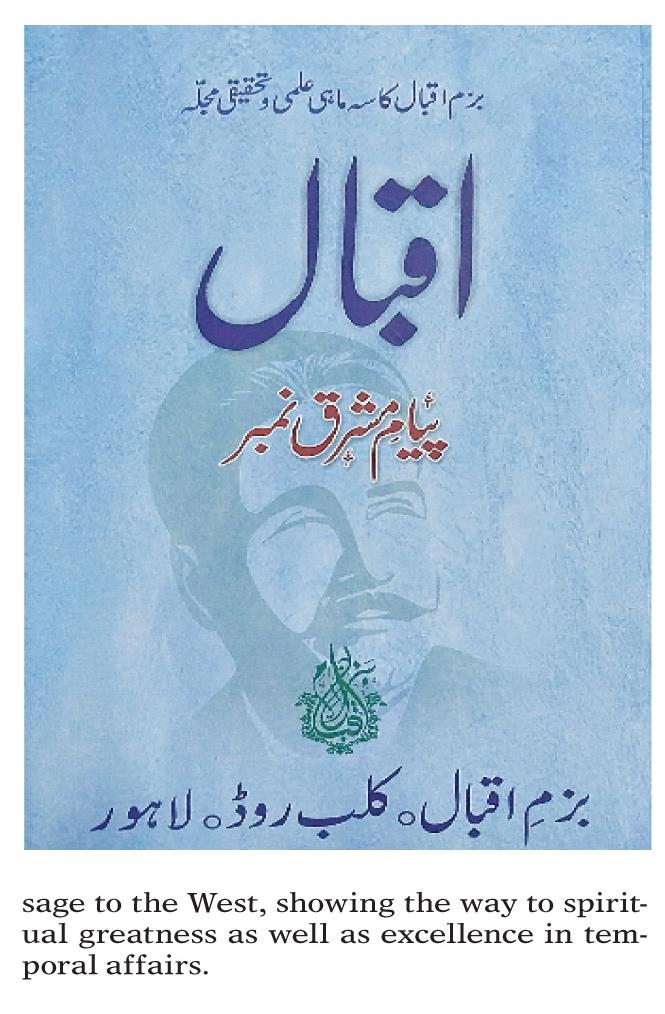The message from the East keeps on resonating
By Rauf Parekh
2025-07-28
HAFIZ Shirazi, one of the greatest poets of Persian, inspired German poet Goethe`s West-Ostlicher Divan, or the West-Eastern Divan. Goethe`s divan`s first edition, published from Stuttgart, Germany, in 1819, had an inscription in Arabic script in Goethe`s own hand that said `An Eastern divan by a Western author`.
Goethe`s poetry, in turn, inspired Allama Muhammad Iqbal`s Payam-i-Mashriq, a fact that can be verified from the cover page of Payam-i-Mashrig, or the message from the East, a collection of Iqbal`s Persian poetry.
The cover page had wording that read `Dar javaab-i-divan-i-shaer-i-almaanavi Goethe` or in reply to German poet Goethe`s divan.
Payam-i-Mashrig first appeared in 1923, that is, 104 years after publication of Goethe`s divan. Iqbal has acknowledged in his preface to Payam-i-Mashrig, too, that it was in reply to Goethe`s divan. But this does not mean that Iqbal was contradicting Goethe, rather Iqbal was affirming Goethe`s thoughts, his universalism and sympathetic approach, as put by Prof Dr Tehseen Firaqi.
It is a fact that Iqbal was very much impressed and inspired by German literature, especially the writings by Goethe andHeinrich Heine. In the preface, Iqbal says that the purpose of Payam-i-Mashrig is `mainly bringing forth the moral, religious and nationalistic facts that deal with the upbringing of individuals and nations`.
Goethe is considered `the philosopher of life`, emphasising a continuous struggle to make life better. Goethe`s thoughts are often considered an embodiment of idea of meliorism, the belief that the world can be made a better place through human action.
Iqbal, too, believed in making life of individuals and nations better through constant struggle. Stressing the responsibilities of a nation and individuals in his preface, Iqbal quotes from the Holy Quran a verse that says Allah will not change the condition of a people until they change what is within themselves. So Iqbal was not writing a rejoinder to Goethe`s divan, but was complementing his ideas. In Heine`s words, as quoted by M. A. H. Hobohm in is article Muhammad Iqbal and Germany: A correspondence of the heart, Goethe`s EastWestern divan is `a nosegay presented by the West to the East as a token of high regards. This divan bears testimony to the fact that West, being dissatisfied with its own spiritual life is turning to the bosom of the East in search of spiritual warmth`. So, Iqbal`s Payam-i-Mashriq is a reciprocal mes-To commemorate 100 years of publication of Payam-i-Mashrig, Lahore`s Bazm-iIqbal has brought out a special issue of its Urdu research journal named Iqbal. Called Payam-i-Mashriq Number, the 600-page issue proffers some very valuable articles, both old and new, authored by some renowned scholars, such as, Aslam Jairajpuri, Ghulam Rasool Mehr, Yousuf Saleem Chishtie, Jagan Nath Azad, Usloob Ahmed Ansari, Rafiq Khawar, Farman Fatehpuri, Iftikhar Ahmed Siddiqi, Ikram Chughtai, Tehseen Firaqi, Hafiz Muneer Ahmed and some others.
It has an English section as well, which includes some historic and memorable pieces: Preface to Papam-i-Mashriq by Iqbal, translated into English by Mumtaz Hasan; Prof Raynold A. Nicholson`s piece, taken from the book Papam-i-Mashrig: Iqbal`s message of the East; Annemarie Schimmel`s article Iqbal and Goethe; and some other scholarly articles. Iqbal had jotted down some notes for writing the preface to his Payam-i-Mashrig. The relic is preserved at Lahore`s Iqbal Museum and has been reproduced in this issue. The English section also includes articles by Hameed Ahmed Khan, Sir Abdul Qadir, S. A. Vahid and Abdullah Anwar Baig.
Bazm-i-Iqbal was established at Lahorein 1950 under the aegis of the government of what was back then called `West Pakistan`. The purpose was to carry out research on Allama Iqbal`s works and philosophy and help spread Iqbal`s message far and wide. Now it works under the umbrella of the department of information and culture, government of Punjab. It is an autonomous body and is managed by a board of governors. Prof Tehseen Firaqi`s taking over as the director of Bazm-i-Iqbal a couple years ago has proved to be a shot in the arm and Bazm-i-Iqbal has now become more active and more efficient.
Afzal Haq Qarshi has succinctly discussed Payam-i-Mashriq`s significance in his editorial note. Qarshi was the member of the journal`s editorial board. The journal was just about to be sent to the press when on Sept 29, 2024, Afzal Haq Qarshi passed away, says a condolatory note published in the issue. Qarshi was a veteran scholar and had served Punjab University`s department of Library Science. In 2008, he headed Punjab University`s Idara-i-Tehgeegaat-iPakistan. Qarshi also edited Majlis-iTaraqqi-i-Adab`s literary magazine Saheefa for a few years. He had joined Bazm-i-Iqbal in2023,adds thenote.
drraufparekh@yahoo.com




